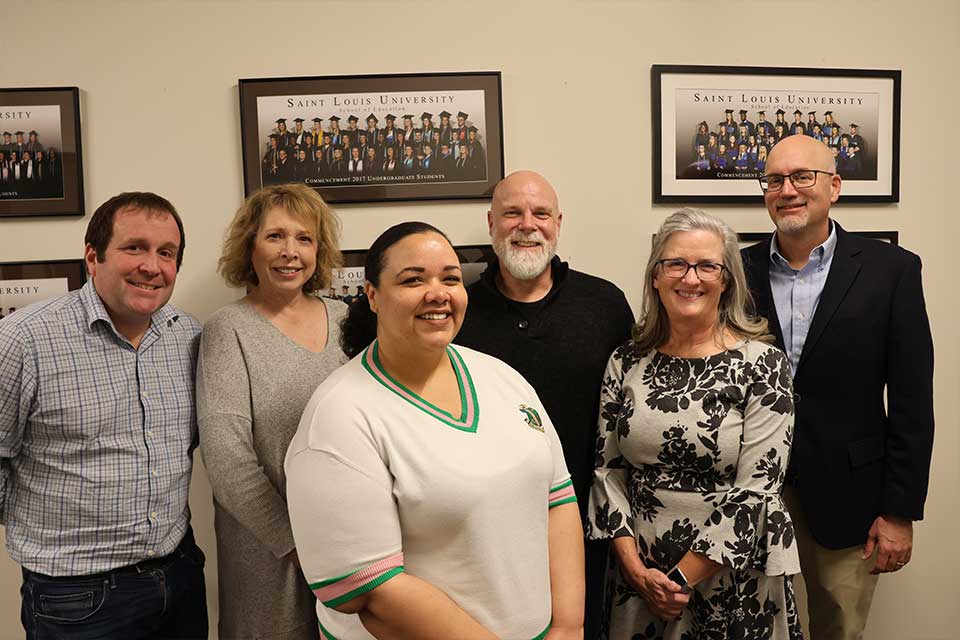Saint Louis University Receives $5.96 Million Grant to Bolster Teacher Ranks in Underserved School Districts
Saint Louis University’s School of Education received a $5.96 million grant from the U.S. Department of Education to address teacher shortages in underserved communities. Through an inventive pilot program, SLU will enroll up to 80 professionals with associate degrees who are already working in school settings in a two-year program, where they will receive a full teaching degree upon completion.
“Our intention is to provide a teaching certification program for those who are already in schools,” said Molly Schaller, Ph.D., associate dean for the School of Education at Saint Louis University. “The landscape has changed a lot in teacher education. There’s a struggle to have licensed teachers in schools and there’s a struggle for paraprofessionals to earn a living wage.
“This program supports those professionals already working in schools, and it supports school districts to be able to invest and develop their own teachers. It’s a win-win for everyone involved.”
Through the federal Supporting Effective Educator Development (SEED) grant, SLU will partner with St. Louis Public Schools, Kansas City Public Schools, Confluence Public Charter System and Kipp School District to enroll teaching assistants, para-teachers and other education professionals currently working in those school districts. The pilot program plans to enroll its first group of participants in Summer 2024 and the SEED Grant will fully cover tuition costs for those participating.
“There can be gaps between students who enroll in teacher degree programs, and those who complete them,” said Bob Vogelaar, Ed.D., assistant professor of education at Saint Louis University. “Because we are partnering with school districts throughout the state, our goal is to ensure that the number of enrollees and completers are one in the same.”
“That’s going to be very attractive to school districts because it gives them the opportunity to invest in their own paraprofessionals. There’s going to be longevity and loyalty between the school districts and these paraprofessionals who become certified teachers that will benefit everyone, including students. There’s going to be value added for the school district’s recruiting and retention efforts that makes this a very unique opportunity for them.”
The two-year program will be completed asynchronously online, in parallel to professionals’ current education-related jobs. Each future teacher enrolled in the pilot program will also receive in-person coaching and will be frequently supported by instructional coaches and teacher mentors. As an online program designed for flexibility and accessibility, SLU’s pilot program is one-of-a-kind and aims to have a broad and immediate impact on these underserved classrooms.
“There aren’t a lot of other institutions doing anything like this,” said Gary Ritter, Ph.D., Dean of the School of Education at Saint Louis University. “Traditional programs are simply not accessible for paraprofessionals who are full-time school employees and likely have other family obligations. We think and we hope the flexibility of this virtual program will make a SLU degree and a teaching license accessible to those who never imagined this was possible.”
While future instructors are the benefactors of this pilot program, students will ultimately reap the rewards.
“It is always about children,” Schaller said. “It is always about the experiences children have in their schools and SLU’s deep commitment to innovate so that they have phenomenal learning experiences.”
“Having a quality teacher is the biggest deal,” added Jeannine Butler, Ed.D., assistant professor of education at Saint Louis University. “Schools can have fantastic curriculums and beautiful learning environments, but without a quality educator, students can suffer. And I’ve seen wonderful teachers in some of the most dire of circumstances, and they’re doing such a service to their students. That’s why we’re so excited about this program. We want to be a part of the solution and bridge some of those gaps.”
This pilot program is firmly in step with SLU School of Education’s mission to support excellence in education and service to the community, especially those who are in need.
“SLU has a continued dedication to educational equity and innovation, and this is an example of that,” Schaller said. “SLU is committed to its community and it’s committed to the students in the community. This program provides a great opportunity for those instructors who have the potential to be wonderful educators. Quality teachers are vitally important and SLU remains committed to providing the very best for the next generation of students.”


















